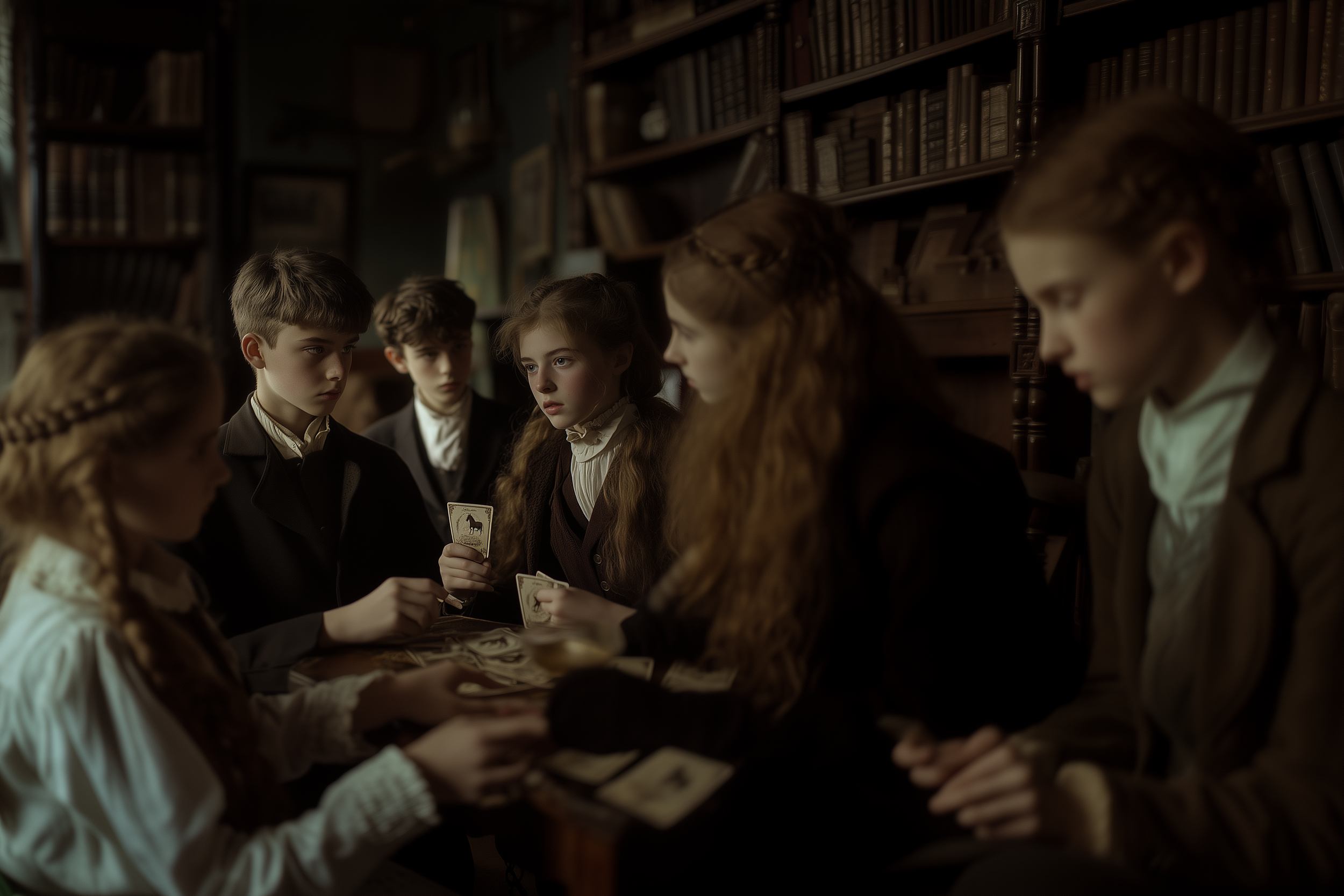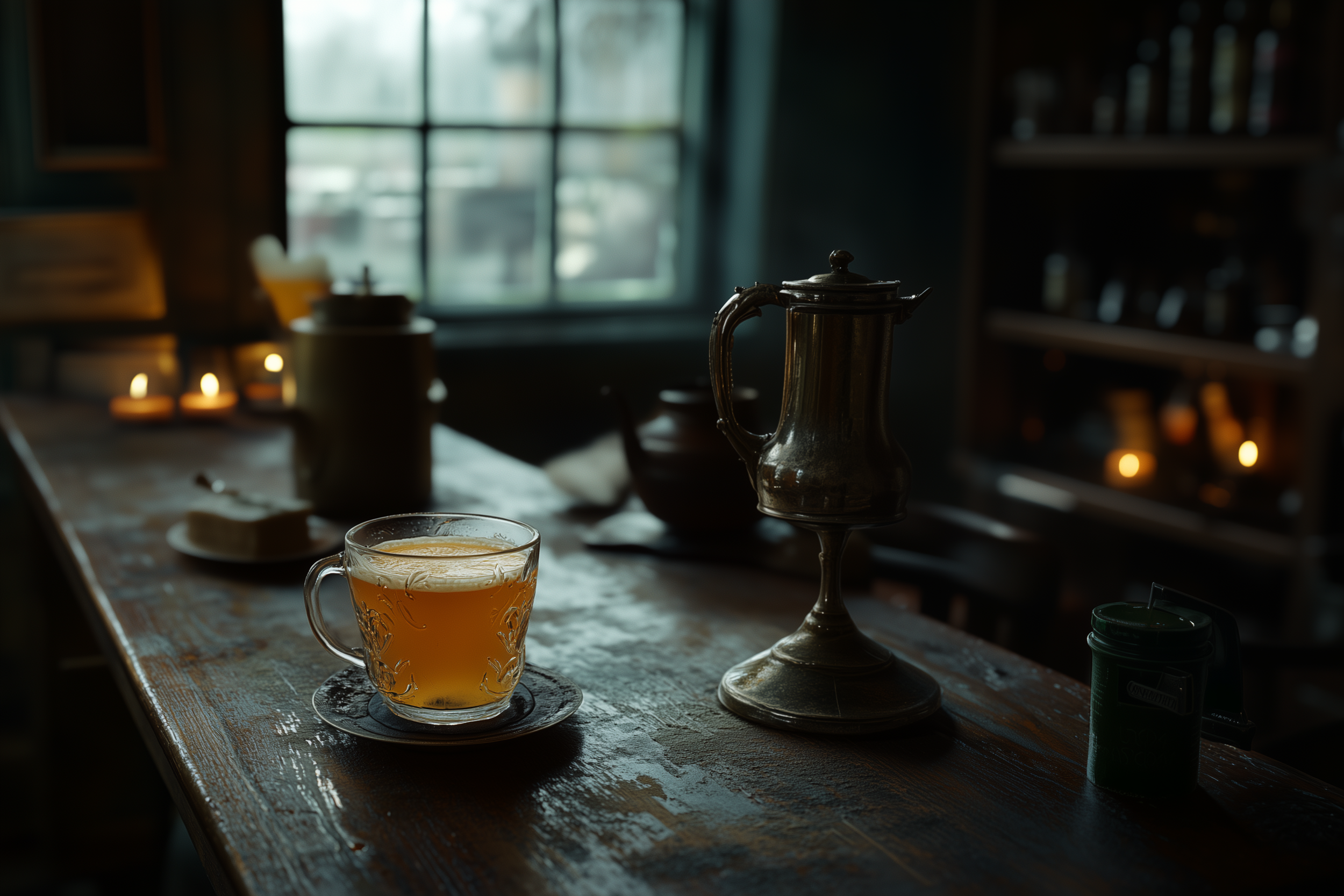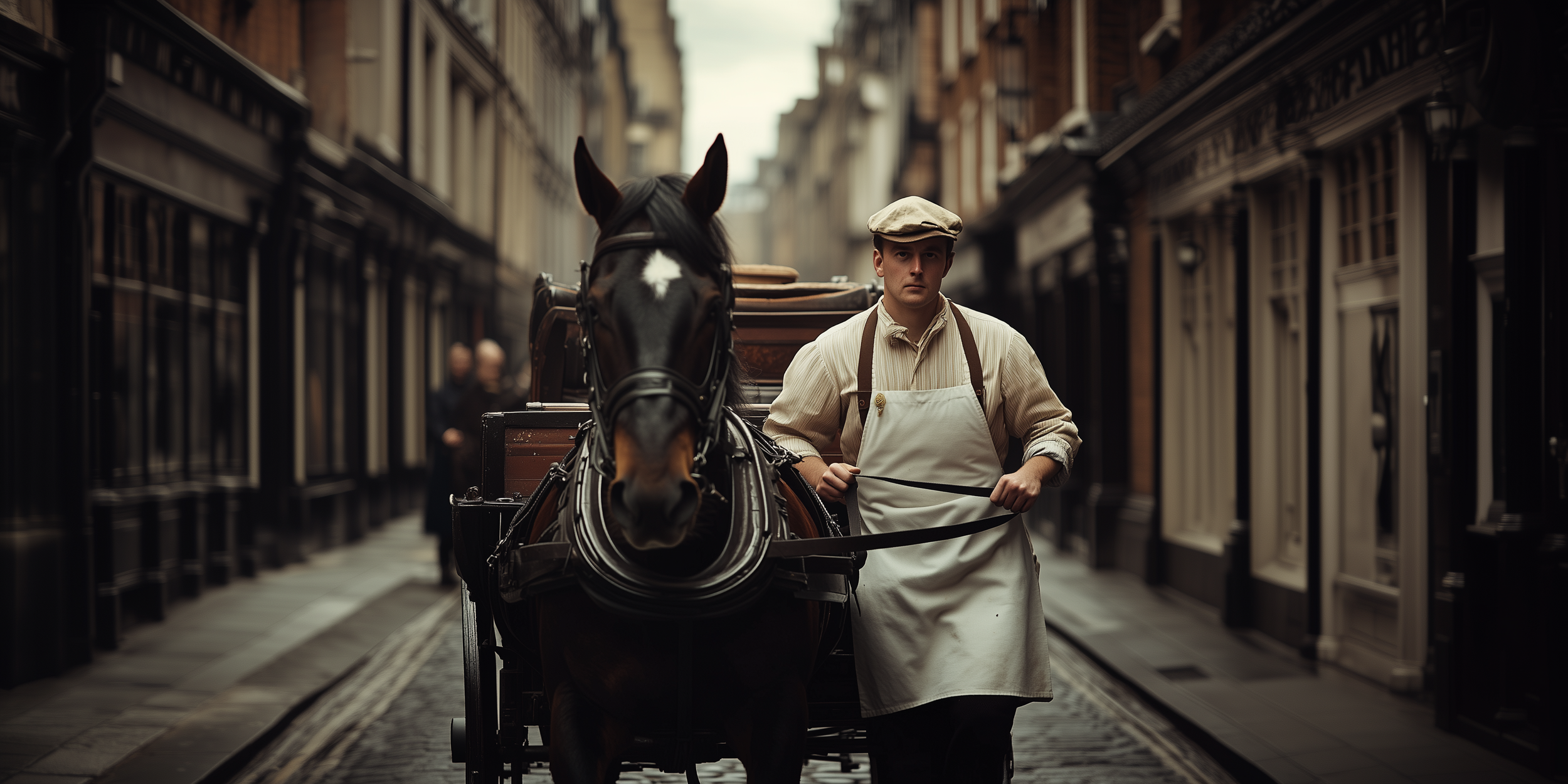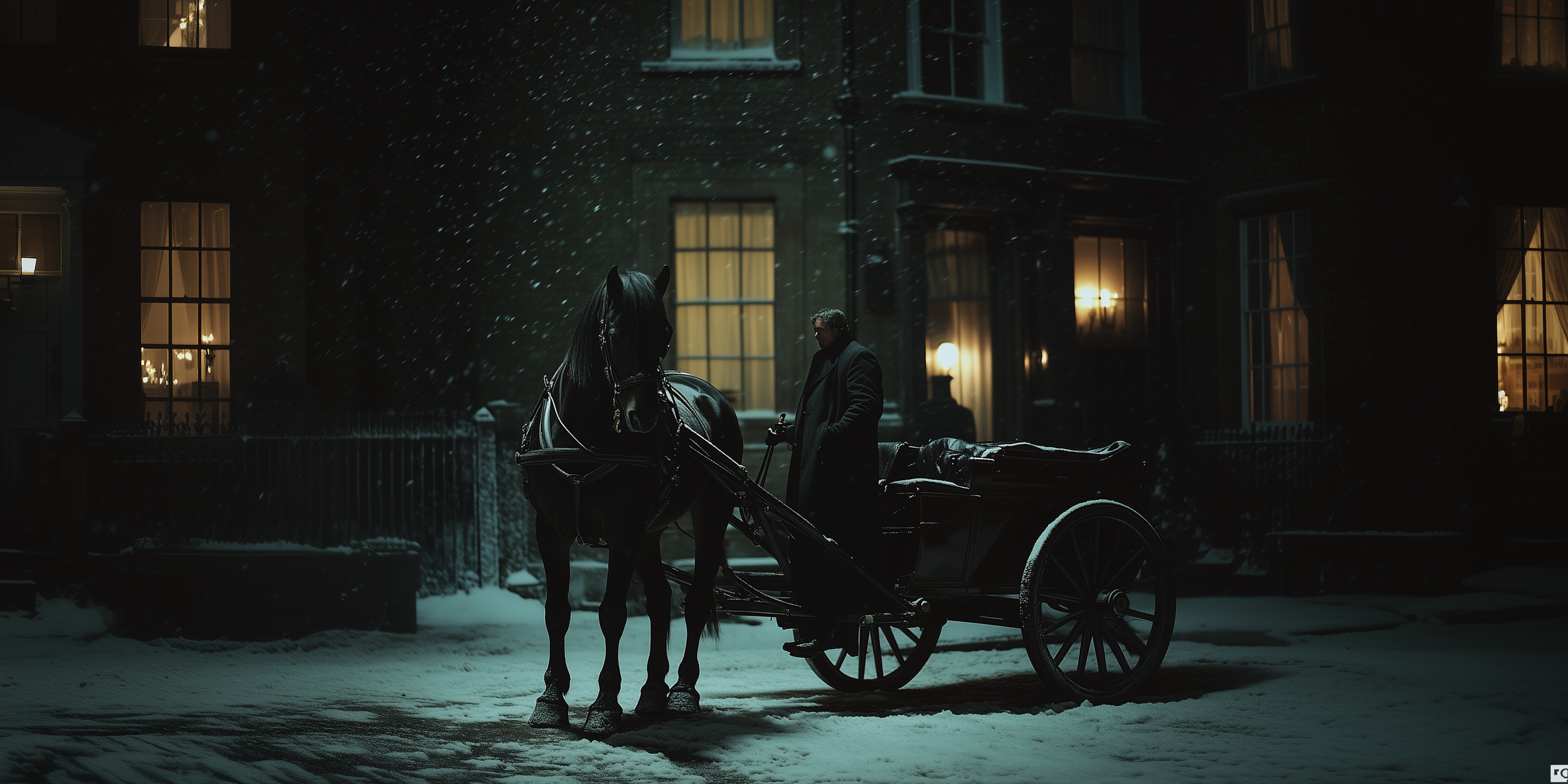PART THREE: THROUGH SHADOWS & STORMS
Once a proud and well-cared-for horse, Black Beauty now faces a world where kindness is scarce and hardship is unyielding. Sold from master to master, he learns that a horse’s fate is balanced between compassion and cruelty, a firm hand and a whip.
Once cherished, he is now a London cab horse, enduring long hours, heavy loads, and ruthless hands. He witnesses the suffering of others—horses broken by overwork, their spirits crushed under the weight of greed.
Yet amid the cruelty, there is a flicker of kindness. Jerry Barker, a cabman with a heart of gold, treats Beauty with the respect he once knew. With steady hands and a gentle voice, Jerry treats him not as a machine, but as a living creature.
Reckless drivers, brutal owners, and the wear of endless labor threaten his spirit. Will he survive the merciless city streets, or will he, too, fall to the fate of the forgotten? A final test awaits—a fight for survival in a world that no longer values him.
PART THREE CONTENTS
Chapter 32: A Horse Fair
Chapter 33: A London Cab Horse
Chapter 34: An Old War Horse
Chapter 35: Jerry Barker
Chapter 36: The Sunday Cab
Chapter 37: The Golden Rule
Chapter 38: Dolly and a Real Gentleman
Chapter 39: Seed Sam
Chapter 40: Poor Ginger
Chapter 41: The Butcher
Chapter 42: The Election
Chapter 43: A Friend in Need
Chapter 44: Old Captain and His Successor
Chapter 45: Jerry’s New Year
Chapter 32: A Horse Fair
Black Beauty has been bought and sold before, but this time, he finds himself in the chaos of a horse fair—a place where horses are nothing more than goods to be bartered and traded.
Rough hands inspect him, prying open his mouth, prodding his legs, and judging his worth with little care for his well-being. To many, he is just another one of the weary, overworked horses.
Some men handle him roughly, testing his strength without concern for his pain. Others make false claims, trying to pass off poor beasts as sound and healthy.
The horse fair is a place of deception and desperation, where a horse’s future can change in an instant—for better or for far worse.
As Beauty waits for his fate to be decided, one question looms—will he fall into cruel hands again, or will fortune finally grant him a kinder master? We can only hope he lands in a worthy place.
A kind man who is knowledgeable of horses makes a bid on him.
HORSE TRADER NEGOTIATION GAME
Horse fairs in Victorian England were lively but harsh places, where horses were examined, bargained over, and sometimes sold to rough or dishonest owners. This game recreates the fast-paced world of horse trading, where players take on the roles of buyers and sellers, practicing negotiation skills while also experiencing the unpredictable fate of horses like Beauty.
Chapter 33: A London Cab Horse
The streets of London are harsh, but for the first time in a long while, Black Beauty finds himself in the hands of a master with a heart of gold—Jerry Barker.
A hardworking cab driver, Jerry treats his horses with kindness and respect, never pushing them beyond their limits, even when the demands of the job grow heavy.
In an industry where most cab horses are driven into the ground, Beauty experiences rare compassion in Jerry’s family.
But life as a London cab horse is still grueling. The endless pounding of hooves on hard pavement, the cold rain, the suffocating heat, and the pressure to earn a living take their toll.
Even with Jerry’s care, Beauty sees the struggles of the working horses around him—many not so fortunate as he.
As he settles into his new life, one question remains—can kindness truly survive in a world that values profit over mercy?
VICTORIAN-STYLE CAB SIGN
During the Victorian era, cab services relied on advertisements to attract customers, often using hand-painted wooden signs or printed posters displayed in stations, stables, or cab stands. Creating a cab service sign inspired by this era is a fun way to step into the world of Black Beauty and imagine how Jerry Barker or another driver might have advertised their honest trade.
Chapter 34: An Old War Horse
Amid the bustling streets of London, Black Beauty meets a fellow cab horse with a past far different from his own—an old war horse named Captain. Once a proud cavalry mount, Captain has seen battle, endured the chaos of war, and carried soldiers into danger. But now, his days of glory are long behind him.
His task has been replaced by the exhausting grind of cab work.
Despite his age and worn body, Captain carries himself with dignity, his spirit unbroken by hardship. As he and Beauty pull side by side under Jerry Barker’s kind care, Captain shares his story—of loyalty, sacrifice, and the brutal fate that awaits too many war horses once their service is done.
But even the bravest hearts have their limits. When tragedy strikes, Beauty learns a painful truth—no matter how strong a horse may be, time and hardship will always take their toll.
A MEDAL OF HONOR FOR CAPTAIN
This craft honors Captain’s dedication by creating a Medal of Honor, much like those awarded to human soldiers. Many war horses throughout history have played vital roles in battles, often saving lives and enduring great suffering. This project helps us reflect on their courage and sacrifice, giving Captain the recognition he—and all war horses—deserve.
Chapter 35: Jerry Barker
In the harsh world of London cab horses, Jerry Barker is a rare kind of man—one who refuses to sacrifice kindness for profit. While other drivers push their horses to exhaustion, Jerry stands firm in his principles, never overworking Beauty or his companion, Captain. He values fairness over greed, treating his horses with the same respect he gives his own family.
But honesty and kindness come at a price. As other cabmen work long hours and drive their horses into the ground, Jerry struggles to make ends meet. The cold, the wet, and the relentless demands of city life weigh on him, but he refuses to bend. No fare is worth cruelty, no profit worth the suffering of his horses.
Yet London is unforgiving, and even the strongest will cannot always fight against fate. As winter deepens, one question looms—will Jerry’s goodness be enough to keep him and his horses from breaking under the weight of hardship?
VICTORIAN CAB LICENSE
Jerry Barker stands apart from many other London cab drivers because of his kindness, honesty, and respect for his horses. Creating a Victorian-style cab license for Jerry Barker honors his dedication to fair treatment and ethical work. This project helps us step into his world, imagining what his license might have looked like and how it could have reflected his strong values.
Chapter 36: The Sunday Cab
Jerry Barker is a man of principle, and no temptation can make him break his most steadfast rule—never working on Sundays. When a wealthy, loyal customer offers him extra pay for a Sunday job, Jerry refuses, even though money is tight.
To him, a day of rest is sacred, not just for himself, but for his horses, who endure grueling work every other day of the week.
His refusal is met with surprise, even disapproval. Other cab drivers mock his decision, and his family worries about lost income. They suspect his loyal customer will go elsewhere.
But Jerry believes that true well-being comes from more than just earning a living—it comes from knowing when to stop.
In a world that demands more, faster, and without mercy, Jerry’s choice is a rare act of defiance. But as hardship looms, the question remains—will his unwavering principles be enough to sustain him and his beloved horses?
DECORATIVE QUOTE POSTER
Jerry Barker is one of Black Beauty’s most admirable characters, a hardworking London cab driver who stands by his principles no matter the cost. Let’s create a Victorian-style “quote poster” to celebrate Jerry’s wisdom and remind ourselves of the timeless value of doing what is right. We’ll blend art with literature, bringing to life the moral lessons of Black Beauty through its design.
Chapter 37: The Golden Rule
Jerry Barker’s honesty and kindness come full circle when his loyal customer returns, proving that standing by one’s principles doesn’t always mean losing out.
Though Jerry had refused to work on Sundays, the gentleman respects his convictions and chooses to ride with him once again. For Jerry, it is a quiet victory—one that reaffirms his belief that doing what’s right is always worth it.
Meanwhile, another act of kindness unfolds when Jerry’s wife, Polly, helps a struggling woman named Dinah Brown. Faced with the sickness of her mother, Dinah is on the brink of despair.
But the Barkers live by the Golden Rule—not just in words, but in action—offering warmth, generosity, and a reminder that compassion can make all the difference.
After making a Sunday trip, Black Beauty, get a chance to rest in a quiet meadow, feeling the soft grass beneath his hooves once more. And Jerry, too, finds his Sabbath truly fulfilled—not just in words, but in spirit—surrounded by nature, free from worry, and reassured that kindness and integrity are never in vain.
SIMPLE APPLE HAND PIES
In Victorian England, home-baked goods were a simple way to show care in working-class households. One such treat might have been apple hand pies—small pastries filled with warm spiced apples, perfect for packing on a restful family outing. They are easy to make, require only a few simple ingredients, and capture the warmth and comfort of a homemade treat.
Chapter 38: Dolly and a Real Gentleman
On a cold, rainy day in London, Jerry Barker’s young daughter, Dolly, finds herself caught in the downpour. With no shelter in sight, she braces against the wet and chill—until an unexpected kindness changes everything. A gentleman, seeing her distress, offers his umbrella and walks her safely home, proving that true gentility is not about wealth, but about kindness.
Jerry is deeply moved by the stranger’s generosity, tipping his hat in gratitude. When most people would have rushed past them without a second glance, this simple act of compassion stands out, reminding the Barkers—and Black Beauty—that goodness can be found in even the busiest of streets.
But this gentleman’s kindness does not stop with people. Later, when he witnesses a driver cruelly mistreating his tired, overworked horse, he does something few others would—he steps in. With sharp, unwavering words, he confronts the man, making it clear that such cruelty is unacceptable.
WARM BARLEY DRINK
Working-class Londoners relied on nourishing drinks to stay warm throughout their grueling days. One such drink was barley water—a warm, mild, and slightly sweet beverage made from boiled barley, flavored with lemon, honey, or spices. It was affordable, filling, and thought to have restorative properties, making it popular among cabmen like Jerry Barker. Let’s make some.
Chapter 39: Seedy Sam
The streets of London are unkind to both horse and man. Black Beauty, now a cab horse, knows the toll of endless work, harsh conditions, and little rest. But as he waits in the cold beside his driver, he meets someone who has suffered just as much—Seedy Sam, a fellow cab driver whose worn-out clothes and hollow eyes tell a story of hardship and exhaustion. Seedy Sam is not a cruel man, nor is he lazy. He is simply one of many struggling to survive in a world that demands too much and gives too little.
With a weak voice and a weary sigh, he speaks of long hours, poor pay, and the toll of endless labor on both man and beast. He has seen horses worked to death, men driven to ruin, and still, the city moves on, indifferent to their suffering.
As Beauty listens, the truth becomes clear—this world does not just break horses, it breaks people too. The cab trade is unforgiving, grinding down those who have no choice but to keep going, no matter the cost.
The weight of the conversation lingers as Beauty pulls his next fare, a silent question hanging in the air—how long before they all become like Seedy Sam?
MINIATURE HORSE STALL DIORAMA
This diorama recreates the cramped, poorly maintained conditions in which many cab horses lived in London during the 1800s. It visually emphasizes the contrast between responsible owners like Jerry and those who neglected their animals, as seen in Black Beauty. Gather your supplies, such as an empty shoebox, popsicle sticks, and dirt or shredded brown paper for the stable flooring.
Chapter 40: Poor Ginger
The streets of London are no place for a horse with a broken spirit. Black Beauty has learned to endure the harsh life of a cab horse, but nothing prepares him for the sight he encounters one fateful day—Ginger. Once proud, fiery, and full of life, she now stands on the side of the road, barely recognizable. Her once-glossy coat is dull, her body thin, her eyes filled with exhaustion.
Ginger has been worked to the bone, pushed beyond her limits, and discarded to the lowest kind of labor. She has no strength left to fight, no spark of rebellion in her tired gaze. As she speaks to Beauty, her voice carries the weight of her suffering. She knows her time is short—there is no kindness in the life of a worn-out cab horse, no gentle hand to ease the pain.
When a horse can no longer work, there is only one fate left. Beauty watches as she is led away, her final goodbye haunting him long after she is gone. The city swallows her up, just as it has so many before. The fiery mare who once defied cruelty is now just another victim of a world that takes and never gives back. For some horses, there is no happy ending.
GINGER BISCUITS
These warm, spiced ginger biscuits are a tribute to Ginger, the spirited and resilient mare from Black Beauty. Just as Ginger endured hardships with strength and fire, these biscuits capture her boldness with a rich, spiced flavor. This simple recipe brings the comforting flavors of Victorian-era baking to your kitchen. Perfect for enjoying with a cup of tea while reading Black Beauty.
Chapter 41: The Butcher
The streets of London are filled with hardship, but not every owner is cruel. Black Beauty encounters a butcher and his horse, and unlike so many others, this man cares for the animal that serves him. His horse is thin and tired, worn down by long hours of work, but there is no malice in the butcher’s hands—only concern. But not everyone shares his patience.
His son, young and reckless, drives the horse too hard, treating it like a machine rather than a living creature. The butcher sees the damage being done, the way exhaustion dulls the horse’s once-strong frame. With firm words, he warns his son—this is no way to treat an animal that gives its best every day. If the boy does not learn, he will soon have no horse left to drive at all.
For Beauty, this moment is a rare glimpse of compassion in a world that too often turns a blind eye to suffering. The butcher is not a rich man, nor can he afford the luxury of treating his horse as a pet. But he understands something many others do not—that kindness and respect can make all the difference in a horse’s life. Will his son learn the lesson before it’s too late?
CLAY HORSE FIGURINE
In Black Beauty, there are countless overworked, underfed, and neglected cab horses that suffer in Victorian cities. This clay sculpture captures their frail, exhausted appearance and serves as a reminder of the hardships faced by working horses. Gather your modeling clay and sculpting tools because we’re going to create a miniature clay horse figuring to go inside our stall dioramas.
Chapter 42: The Election
In the bustling streets of London, election fever grips the city, and cab drivers are in high demand to ferry voters to the polls. Among them is Jerry Barker, a man of principle who refuses to compromise his values for profit.
When approached by a political agent offering to hire his cab for the election, Jerry declines, unwilling to adorn his cab with partisan colors or transport inebriated voters, actions he believes undermine the integrity of the electoral process.
At home, the election’s divisive nature hits close to the Barker family. Jerry’s daughter, Dolly, returns in tears, her dress soiled by boys who mocked her perceived political affiliation based on the color of her dress. Her brother, Harry, defends her honor, leading to a scuffle. Jerry seizes this teachable moment to impart wisdom to his children, emphasizing that virtue and vice are not confined to political colors. He stresses the importance of voting according to one’s conscience and respecting others’ rights to do the same, cautioning against blind allegiance to party lines.
He reminds his children that true liberty is exercised not through partisan fervor but through thoughtful, conscientious participation in the democratic process.
VICTORIAN ELECTION POSTER
This poster-making activity will give you the chance to design a creative, meaningful poster that promotes thoughtful decision-making in elections. With this project, we’re reminded that making informed choices matters more than merely following traditions. By making an election poster, we’ll engage with Black Beauty’s themes while considering real-world electoral responsibilities.
Chapter 43: A Friend in Need
The streets of London are restless, still caught in the fever of the election. Cab drivers are in high demand, and many, driven by profit, rush through the crowded streets without care. But amid the noise and commotion, Jerry Barker remains true to his principles—until he is faced with a test of kindness greater than any political fare. A desperate young mother appears, clutching her sick child, her voice trembling as she asks for directions to the hospital. The baby is weak, growing worse with every passing moment, and she has no way to get there in time.
Without hesitation, Jerry tells her to climb into his cab, refusing to take a penny. But before he can set off, two rowdy election workers shove their way forward, demanding his service for their political errands. They don’t care about the woman’s struggle—only their own agenda. Jerry stands firm, refusing to give in, even as the men curse and threaten him. Eventually, they storm off, and with a flick of the reins, Black Beauty pulls the cab through the crowded streets, carrying the mother and child to safety.
As Beauty moves swiftly through the cold, he knows this is the kind of master every horse dreams of—one who chooses what is right over what is profitable. But as winter deepens and the toll of long hours sets in, one question lingers—how long can kindness stand against hardship?
CARROT & APPLE MUFFINS
In Black Beauty, horses often find comfort in simple, natural foods like oats, carrots, and apples—ingredients that make this recipe both horse-friendly and human-friendly. These muffins are mildly sweet, moist, and packed with fiber, making them a perfect snack to enjoy with a cup of tea or to share with a four-legged friend. Enjoy these wholesome carrot and apple muffins.
Chapter 44: Old Captain and His Successor
Winter’s icy grip tightens around London, making life even harder for cab horses and their drivers. Black Beauty has seen many horses pushed past their limits, but few have endured as long as Old Captain—a sturdy, faithful horse who has served his master well for many years. But no horse, no matter how strong, can outrun time—or misfortune. One bitterly cold day, disaster strikes.
As Old Captain pulls his cab through the slippery streets, another vehicle crashes into them. The accident is sudden, violent, and final. Though he survives, it is clear to everyone that Captain’s working days are over. He has given everything he had.
With Captain gone, a new horse arrives to take his place—Hotspur, young, energetic, and full of promise. At first, he handles the job well, but the cab trade is relentless, and experience has taught Beauty how quickly strength can be drained. How long before Hotspur, too, feels the weight of endless work? And as another horse steps into the cycle of labor, one question lingers—how many will come and go before it is Beauty’s turn?
AN OBITUARY FOR CAPTAIN
In Black Beauty, Captain was a noble and hardworking war horse who spent his later years pulling a cab for Jerry Barker. His strength, loyalty, and resilience made him a beloved companion, and his passing was deeply felt. This activity allows us to reflect on Captain’s character and express gratitude for his service by writing a thoughtful obituary in his honor. We’ll provide examples of Captain’s accomplishments and allow you to read the obituary aloud in honor of the old war horse’s memory.
Chapter 45: Jerry’s New Year
The bitter cold of New Year’s Eve settles over London, turning the streets into a frozen wasteland. Jerry Barker and Black Beauty wait in the icy night, their breath rising in the freezing air, as they hold their post for two men attending a party. Hours pass, and the chill digs deep into their bones, but there is no relief—only the promise of one last fare before the night is over.
When the men finally emerge, laughing and warm from their evening’s celebration, they hardly notice the driver and horse who have stood shivering in the cold. By the time Jerry and Beauty return to the stable, the damage has been done. The cold has seeped into Jerry’s lungs, his deep cough turning into something far worse. As the days pass, it becomes clear—Jerry is too ill to drive a cab again. With no choice left, Jerry and his family must leave London behind, retreating to the countryside where he can recover. But while they seek peace and rest, Black Beauty will not be going with them. Once again, he must be sold, his future left uncertain. As Beauty watches Jerry walk away for the last time, he wonders if he ever find a master as kind as Jerry again?
SPARKLING NEW YEAR’S DRINK
This non-alcoholic Sparkling Apple & Ginger Mocktail is a festive and refreshing way to toast Black Beauty’s future. The apple represents warmth and familiarity, while the ginger adds a bold kick, symbolizing Beauty’s enduring strength. The sparkling fizz captures the excitement of new possibilities ahead.































